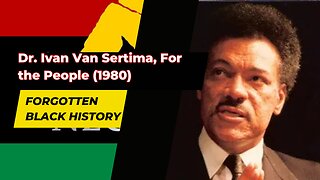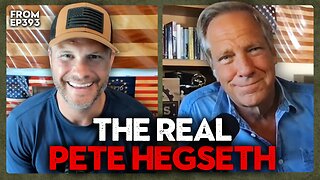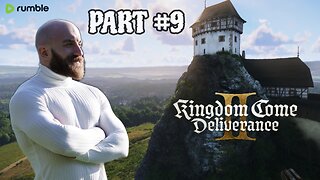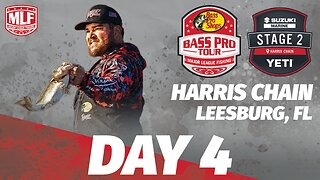Premium Only Content

DAVID ABNER SR. (1826-1902)
This video is brought to you by, Fiverr: https://go.fiverr.com/visit/?bta=500952&brand=fiverrhybrid
Fiverr Learn: https://go.fiverr.com/visit/?bta=500952&brand=fiverrlearn
Fiverr Business: https://go.fiverr.com/visit/?bta=500952&brand=fb
Become a Fiverr Affiliate: https://go.fiverr.com/visit/?bta=500952&brand=fiverraffiliates
Fiverr Workspace: https://go.fiverr.com/visit/?bta=500952&brand=workspace
Welcome to "Forgotten Black History". On this channel we talk about special places, events and people in Black History, This page serves as an index to the prominent figures featured throughout the Black History society. Black history is the story of African Americans in the United States and elsewhere. We want to celebrate, remind, and pay respect to not only African Americans but Black people of all races and backgrounds. We hope you subscribe to join the family, so we can grow a small community to help people of all races know just how special black people actually are in the world. Thank you for taking the time out to visit our channel. We hope you subscribe, if you hadn't already. We wish you peace and love, and for you to stay safe out there.
#BlackHistory #ForgottenBlackHistory #BlackPeople
Check out our Rumble page for exclusive videos: https://rumble.com/c/c-1788327
David Abner, black Texas legislator, was born enslaved in Selma, Alabama, in 1826 and brought to Texas in 1843 by the daughter of his master who, with her husband, settled in Upshur County. Abner remained there until after the Civil War. In 1866 he moved to Marshall, Texas. After settling in Harrison County, the former slave became a prosperous farm worker, and after a few years of hard labor and frugal living he managed to buy the farm. By 1876, he was signing notes, bonds, and securities for thousands of dollars for whites as well as blacks. According to oral sources, Abner was a natural politician. After settling in Marshall, he was appointed to the State Executive Committee of the Colored Men’s Convention of 1873 and was later elected Harrison County treasurer. Abner served in the legislature from 1874 to 1875.
Abner participated in many civic activities in Harrison County. He helped to organize Bethesda Baptist Church and became one of its first deacons. He also helped to establish the first elementary school for blacks in Harrison County. After leaving the legislature he continued his interest in education. Abner was one of the leaders in the movement to establish Bishop College and served as one of the two original black trustees.
The 1880 census listed him as a farmer. He and his wife, Mollie, reported eight children in their household. Seven were Abner’s children from a previous marriage, including David Abner, Jr., and two stepchildren; one child, Lucy, was Mollie’s daughter from a previous marriage. When Abner retired from the legislature he went into the ice business in order to enhance an already sizable estate, which included over 300 acres of land in East Texas. He died in 1902 and was buried in a family plot in the Older Powder Mill Cemetery, Marshall.
-
 1:01:09
1:01:09
Forgotten Black History
2 months agoDr. Ivan Van Sertima, For the People (1980)
1143 -
 59:31
59:31
Squaring The Circle, A Randall Carlson Podcast
8 hours ago#039: How Politics & War, Art & Science Shape Our World; A Cultural Commentary From Randall Carlson
3.39K2 -
 13:21
13:21
Misha Petrov
8 hours agoThe CRINGIEST Thing I Have Ever Seen…
3.56K28 -
 11:45
11:45
BIG NEM
4 hours agoWe Blind Taste Tested the Best Jollof in Toronto 🇳🇬🇬🇭
1.15K -
 15:40
15:40
Fit'n Fire
8 hours ago $0.04 earnedArsenal SLR106f & LiteRaider AK Handguard from 1791 Industries
1.01K1 -
 8:34
8:34
Mike Rowe
6 days agoWhat You Didn't Hear At Pete's Confirmation Hearing | The Way I Heard It with Mike Rowe
38.8K18 -
 7:13:44
7:13:44
TonYGaMinG
9 hours ago🟢LATEST! KINGDOM COME DELIVERANCE 2 / NEW EMOTES / BLERPS #RumbleGaming
61.8K4 -
 40:17
40:17
SLS - Street League Skateboarding
4 days agoEVERY 9 CLUB IN FLORIDA! Looking back at SLS Jacksonville 2021 & 2022 - Yuto, Jagger, Sora & more...
107K1 -
 2:00:47
2:00:47
PaddysParlorGames
18 hours agoSunday Parlor Chill: GOBSTEIN
67.2K3 -
 LIVE
LIVE
Major League Fishing
5 days agoLIVE! - Bass Pro Tour: Stage 2 - Day 4
143 watching